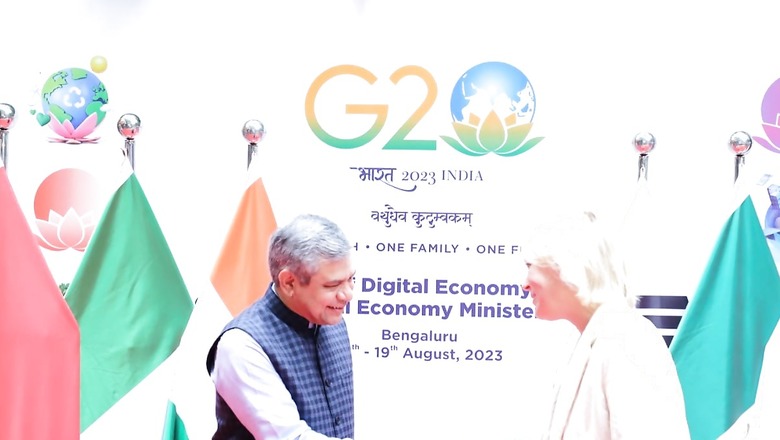
views
Under India’s presidency, the G20 Digital Economy Ministers made history by coming to a ground-breaking agreement on how to successfully build future digital public infrastructure (DPI) as a catalyst for the Sustainable Development Goals (SDGs). In the Digital Economy Working Group, the World Bank and the United Nations Development Programme (UNDP) worked together with the Government of India as a knowledge partner on DPI.
For the first time, a group of nations has collectively adopted a definition of DPI as a collection of interconnected digital systems that should be secure and interoperable, that can be constructed using open standards, and that support universal access to services, with governance and community as its primary pillars.
A set of high-level guiding principles for DPI has also been adopted, which encourages DPI governance for public benefit, trust, and transparency as intrinsic characteristics of the digital public infratructure.
The G20 India Presidency, in collaboration with UNDP, introduced two documents or publications to assist nations in advancing their digital transformation path with speed, scalability, and inclusiveness.
In an exclusive interview to News18, Ulrika Modéer, the UN Assistant Secretary-General and Director of the Bureau of External Relations and Advocacy at UNDP, discussed the importance of the digital public infrastructure and digital public goods (DPG) in the context of global development.
Modéer also shed light on how digital development isn’t confined to the tech industry and is rather a pivotal tool for societal progress and the attainment of the Sustainable Development Goals. According to her, digital development is not merely a technological endeavor but a global imperative that requires collaboration and guidance to create a more equitable and sustainable world.
As the world grappled with the challenges of the Covid-19 pandemic, DPI and DPG emerged as critical themes in the realm of international development. According to Modéer, the UNDP recognised their importance ahead of the pandemic and came out with a global report on human development, which looked at the increasing inequalities across the world and identified digital as a key driver and enabler for the SDGs.
The pandemic expedited the digitalisation process in many countries, with India serving as a notable example. “In this case, India has been a source of inspiration for many countries and also for us at UNDP,” Modéer told News18.
She further highlighted the fact that the Covid-19 pandemic has made countries really think through what has to be a digital journey to create more resilience in times to come.
However, the pandemic also led to setbacks in SDG progress due to issues like inflation. “Because of the pandemic, there are other consequences that we have seen with regard to inflation. [But] countries that do invest in a strategic digital public infrastructure framework, those that learn from other countries and invest in the digital journey, will be much more able to accelerate the SDGs.”
Key Publications
The UNDP, along with the Indian government, has released two very important publications — ‘The DPI Approach’ and ‘Accelerating The SDGs Through Digital Public Infrastructure’. Modéer explained the purpose of UNDP’s publications, emphasising that the interconnected nature of the 17 SDGs requires holistic solutions.
“The reason why we work with Indian chairmanship for these publications was that there is a need, I think, for many actors to understand that digital development is not something for the tech industry, this is something central to governance, not only to one ministry but to the whole of government and the whole of society,” she said.
While talking about these publications and highlighting examples from India, the UN official spoke about India’s Aadhaar system, which has showcased a significant example of successful DPI implementation, as well as the CoWIN platform, which received support from UNDP.
India’s G20 Presidency
Modéer commended India’s presidency of the G20 and its leadership in ensuring a comprehensive outcome. She emphasised that UNDP, with its presence in 170 countries, receives numerous requests for support in the digital journey and framework development.
Reflecting on her visit to Bangalore, Modéer praised India’s leadership and its robust ecosystem, particularly in the technology sector. She noted: “It is interesting to see how travelling now arriving in Delhi and how the G20 presidency is very present here. It tells the story of how India can lead and also in these difficult times, geopolitically of course, when there is a lot of conflict in interests, I think India is incredibly well placed.”
DPI Journey in Other Countries
Modéer stressed the importance of understanding the local context while working with countries on their DPI journey. “We need to understand the local context well as we work closely with the government and a bit also with the key actors to look at how we can create an enabling environment whether in relation to legislation, how countries can attract investments and also to understand the innovation that is happening with each and every country,” she said.
While talking about other countries and their digital journey, the UN official said that UNDP has supported different initiatives, such as in Africa and Ethiopia, as well as in Ukraine, where the Diia app has enabled Ukrainian citizens to access more than 80 governmental services through their smartphones.
However, according to Modéer, there are many countries that need proper guidance, a DPI framework, with the right approach and digital literacy, which was also part of discussions during G20 meetings. She further noted that since the digital divide is also reflected in men, women, girls, and boys, gender equality is something that everyone needs to pay a lot of attention to.
She believes that in order to achieve results and impact, a broad range of actors need to be involved, including government, the private sector, civil society, and citizens. This is because all of these actors have a stake in the success of digital development around the world.
Modéer’s insights shed light on the UN’s commitment to utilising digital development as a catalyst for achieving the SDGs and she believes that examples like India can give guidance for future work in G20.




















Comments
0 comment